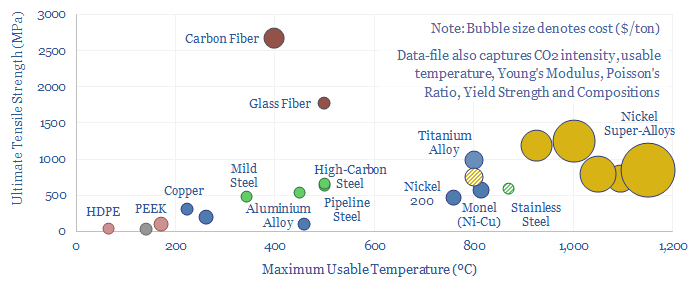Search results for: “global temperature climate science”
-
Costs of climate change: a paradox?
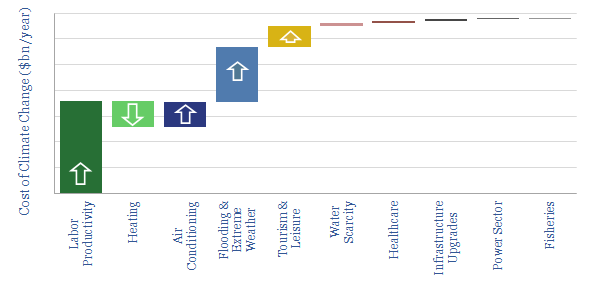
The unmitigated costs of climate change will likely reach $1.5trn per annum after 2050, exerting an enormous toll on the world. However, the costs of the energy transition will exceed $3trn per annum. Our 14-page note explores whether this mismatch matters. Could it even undermine the energy transition?
-
Economic costs of climate change?

This data-file contains our estimates into the economic costs of unmitigated climate change, using the latest disclosures from the IPCC as a framework. We estimate the total costs could reach $1.5trn per annum, including productivity losses, incremental energy costs and more prevalent natural disasters.
-
Power generation: sensitivity to high-temperature heatwaves?
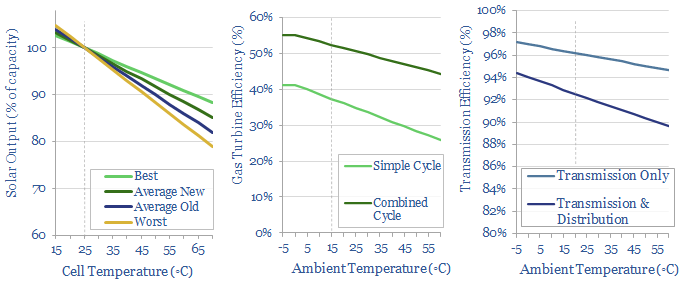
This data-file aims to provide a simple model for how generally well-covered grids can fail catastrophically during a heatwave. We have drawn on technical papers to quantify the deterioration of solar, gas, transmission and distribution losses, wind and other generation sources at higher temperatures.
-
Energy market volatility: climate change?
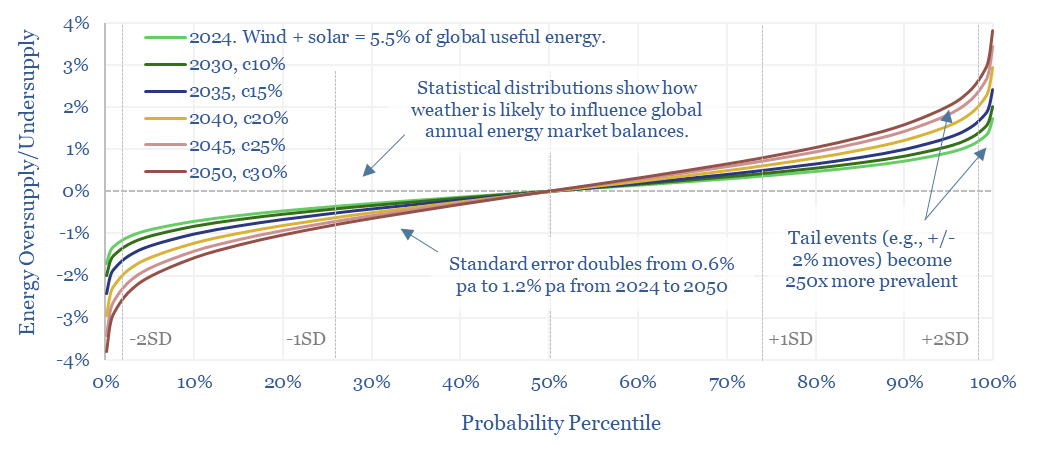
This 14-page note predicts a staggering increase in global energy market volatility, which doubles by 2050, while extreme events that sway energy balances by +/- 2% will become 250x more frequent. A key reason is that the annual output from wind, solar and hydro all vary by +/- 3-5% each year, while wind and solar…
-
Air conditioning: energy consumption?
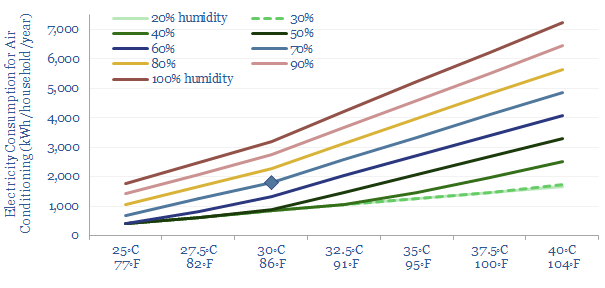
The average US home uses 2,000 kWh of electricity for air conditioners each year. Air conditioning energy consumption is broken down from first principles in this data-file, as a function of temperatures, humidity, heating days, household size, insulation and coefficient of performance (COP). What routes to lower the air conditioning energy demand and CO2 emissions?
-
Combustion fuels: density, ignition temperature and flame speed?
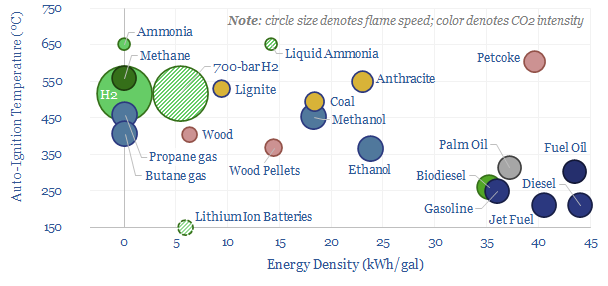
The quality of a combustion fuel comes down to its physical and chemical properties. Hence the purpose of this data-file is to aggregate data into different fuels’ energy content (kg/m3), energy density (kWh/kg, kWh/gal), flash point (ºC), auto-ignition point (ºC) and flame speed (m/s, cm/s). Conclusions about high quality fuels follow.
-
Photo opp: reforestation, CO2 fertilization and global temperatures?
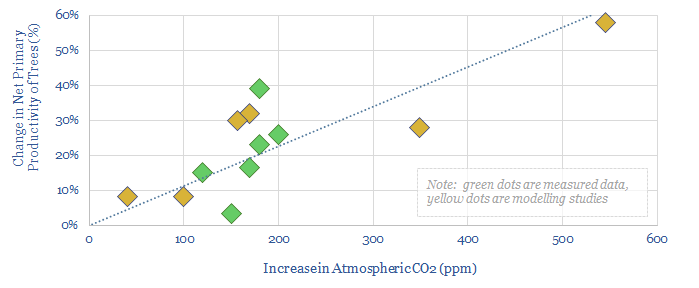
Well-crafted reforestation projects may absorb atmospheric CO2 25% more rapidly than in the past, aligning species and site selection with the world’s changing climate. This work outlines the bio-chemistry of CO2 fertilization and temperature changes on photosynthetic productivity.
-
CO2 intensity of wood: context by context?
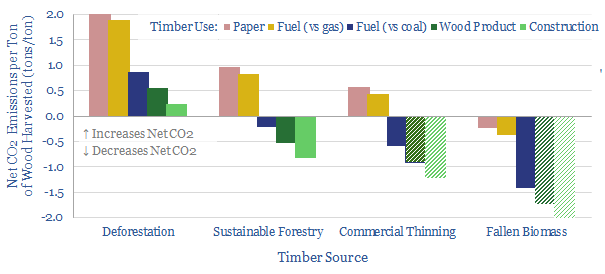
This data-file calculates the CO2 intensity of wood in the energy transition. Context matters, and can sway the net climate impacts from -2 tons of emissions reductions per ton of wood through to +2 tons of incremental emissions per ton of wood. Calculations can be stress-tested in the data-file.
-
Air conditioning: energy demand sensitivity?
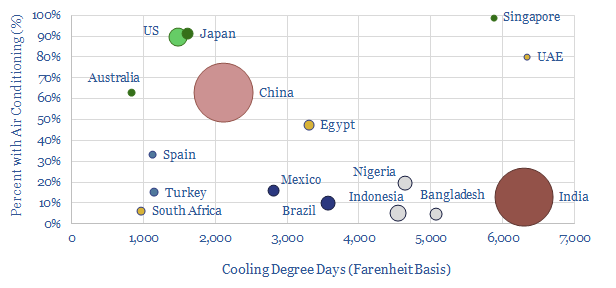
This data-file quantifies air conditioning energy demand. In the US each 100 variation in CDDs adds 26 TWH of electricity (0.6%) demand and 200bcf of gas (0.6%). Air conditioning already consumes 7% of all global electricity and could treble by 2050.
Content by Category
- Batteries (89)
- Biofuels (44)
- Carbon Intensity (49)
- CCS (63)
- CO2 Removals (9)
- Coal (38)
- Company Diligence (94)
- Data Models (838)
- Decarbonization (160)
- Demand (110)
- Digital (59)
- Downstream (44)
- Economic Model (204)
- Energy Efficiency (75)
- Hydrogen (63)
- Industry Data (279)
- LNG (48)
- Materials (82)
- Metals (80)
- Midstream (43)
- Natural Gas (148)
- Nature (76)
- Nuclear (23)
- Oil (164)
- Patents (38)
- Plastics (44)
- Power Grids (130)
- Renewables (149)
- Screen (117)
- Semiconductors (32)
- Shale (51)
- Solar (68)
- Supply-Demand (45)
- Vehicles (90)
- Wind (44)
- Written Research (354)
